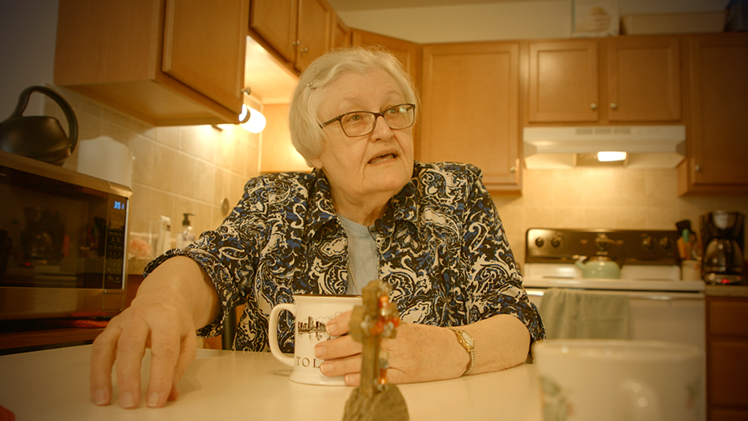A documentary film focused on the grassroots efforts to support Toledoans with HIV/AIDS during the early years of the epidemic will air on WGTE-TV at 3 p.m. Sunday, June 16.
“Sister Eileen and Her Boyz, an HIV in the Rust Belt Story,” was directed and produced by Holly Hey, a professor of film and video production at The University of Toledo.

Sister Eileen Schieber from the documentary “Sister Eileen and Her Boyz,” directed and produced by Holly Hey, a professor of film and video production at The University of Toledo.
The 30-minute film was selected this spring for nationwide distribution on PBS by the National Educational Telecommunications Association.
“Sister Eileen and Her Boyz” chronicles the work of Sister Eileen Schieber, who moved to Toledo in 1987 to serve as vicar for religious within the Diocese of Toledo and soon became a leading advocate for individuals with HIV/AIDS at a time when the virus and illness it caused was highly stigmatized.
Schieber first became involved with a volunteer group called N.O.V.A, or No One’s Victory Alone, and later played a major role in establishing David’s House Compassion, a housing shelter and resource center for people with HIV/AIDS.
“Sister Eileen had this ability to bring people together and educate without making people feel threated or anxious,” Hey said. “She was mild-mannered in appearance and tone but if you’re in a fight you want her on your side. She had those hard and soft skills that helped make David’s House Compassion so successful.”
Hey began exploring a documentary about long-term HIV/AIDS survivors in northwest Ohio in 2019 at the suggestion of Sue Carter, a retired HIV social worker at The University of Toledo Medical Center.
She found a surprisingly robust wealth of material that she said shines a light on the issues faced in rust belt communities and how those communities came together to help those who in many cases had nowhere else to turn.
“A lot of what we hear about the epidemic in the late 1980s and early 1990s is isolated into coastal cities — New York, Boston, Cape Cod, Los Angeles, San Francisco — but there was a lot of innovative care and treatment that was happening right here in our own back yard,” Hey said. “What was happening here, and the work being done by Sister Eileen, was quite radical for the time.”
Hey’s long-term goal for the project is a three- to five-part series that weaves together the stories of local long-term HIV/AIDS survivors and those, like Schieber, who took it upon themselves to help care for them.
Much of the project focuses on David’s House Compassion, which opened in 1990 and served individuals with HIV/AIDS for nearly 15 years. “Sister Eileen and Her Boyz” is the first completed film from the planned series.
The film has already aired in several major markets, including Los Angeles, Orlando, Philadelphia and Washington, D.C., and is scheduled to air on PBS affiliates in Chicago, Phoenix and San Francisco this month.
Co-producers on the project include Carter, Dr. Ally Day, an associate professor in the Department of Disability Studies, and Richard Meeker, manager of community engagement and development at the UTMC Care Clinic.
Hey’s previous work distributed by the National Educational Telecommunications Association includes “Reentry Realities: Hope Deferred,” a short documentary focusing on a longtime Ohio inmate’s effort to develop a reentry program for fellow prisoners, and “Crossing Water: Portraits from Flint, Michigan,” which documented a group of volunteers working to help residents struggling with the Flint water crisis.